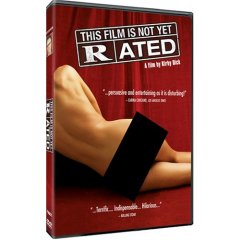
Click on cover to buy this film from Amazon.com for only $17.99

Reprinted with permission of Dr. Marty Klein from blog www.SexualIntelligence.org
Imagine a small group that controls what movies a country's citizens can see, what films can be advertised, what pictures and words filmmakers are allowed to use. Imagine that the names of the group's members are strictly secret, as are the rules they use to determine what filmmakers can do and what the public can see.
Is this Russia's KGB? Saudi Arabia's Wahhabis? Castro's revolutionary censors?
No, it's the Motion Picture Association of America, the private board that chooses a film's rating--which shapes who can see it and where it will be shown. Their control extends to DVDs too, because chains like Blockbuster and Wal-Mart restrict the sale of R-rated films and won't carry films rated NC-17 at all. That's why the documentary This Film Is Not Yet Rated won't be carried in the 10,000 U.S. stores the two companies control. It's also why newspapers won't accept ads for the film, even ads that are completely tame.
This Film... is an entertaining, 90-minute documentary available through Netflix. It features interviews with many well-known movie people, such as director John Waters, Newsweek critic David Ansen, and "South Park" producer Matt Stone. All agree that the MPAA is a corrupt, secretive, punitive organization that damages both American cinema and American freedom. Even these huge names have been unable to get straight answers from the MPAA.
In repeated interviews, MPAA President Jack Valenti is shown to be self-deluding, hypocritical, or both. When he claims the ratings board helps filmmakers and families, he offers no evidence of either. The board's chair says the board is composed of ordinary "parents," and that experts in psychology, sociology, art, and child development are simply unnecessary. Yet the board regularly consults Christian clergy. And by the way, almost none of these "parents" have children under 25.
An intriguing story line keeps the film moving. Filmmaker Kirby Dick actually hired a private investigator to uncover board members' names, and we follow her as she stakes out the MPAA building, follows and secretly photographs staffers at lunch, and even steals information.
The film exposes the lie of "liberal Hollywood" when it shows that 90% of the film industry is controlled by just six gigantic corporations, like Viacom and Walt Disney--hardly leftist revolutionaries.
The film also shows how the ratings board cares way more about sexuality than about violence; for example, stabbing a woman in the half-naked breast is considered acceptable for children to see, while caressing even a clothed breast is not (nor is the word "tit"). The MPAA is not required to justify this, and they don't. They don't even have to admit that they do this, even when confronted by data collected by social scientists or filmmakers.
The MPAA is fond of saying that the ratings system isn't "censorship," because filmmakers are free to make what they want, as long as they accept the restrictive rating that will damage or destroy their production. That's like saying a sheep is free to hang out with wolves. The problem is not the choice, it's the consequences.
Of course, "non-censorship" comes in many insidious forms: PBS losing funding for including a gay character in a cartoon show; teachers losing jobs for answering "unauthorized questions" in sex education class; publishers who won't publish a book that Barnes & Noble and Borders deem "controversial." Government and university employees around the country report that their computers refuse to accept Sexual Intelligence ("unauthorized sexual content"), and cannot be reconfigured.
This film ratings system is so secretive, so corrupt, and so powerful that a government ratings board--which we condemn 100%--would actually be an improvement. At least it would have to be somewhat transparent: we'd know who was on it, everyone could read its rules, and there'd be a rational appeals process. Imagine--American film suffers with a censorship system so fraudulent that government censorship would be an improvement.
This Film… climaxes with its own application for a rating. When it's slapped with an NC-17 for "general sexual content," we listen in on Kirby Dick trying to get information about the process from the board's chair. When he appeals the decision, he can't show us much--not only is the appeals hearing closed, transcripts or other records are forbidden. If the appeals board bases its decision on personal vendettas or a film's political content, there's no way of ever knowing.
Newsweek critic David Ansen says of the MPAA's puritanism and unaccountability, "Even though it's supposed to protect children, it's turning us all into children." The film raises a simple question: Is there a place in our culture for movies someone doesn't want your kids to see?
Return to Front Page